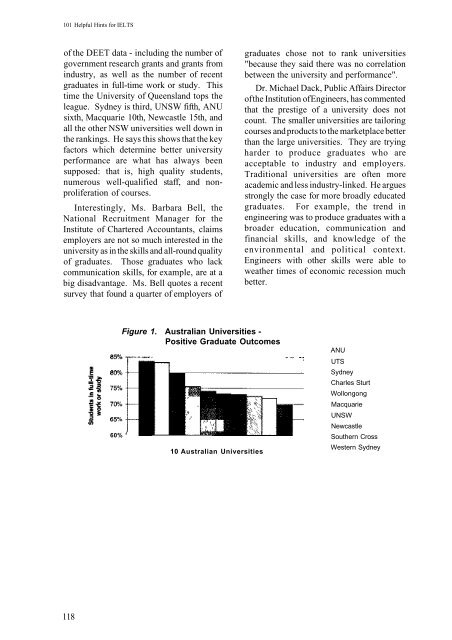You also want an ePaper? Increase the reach of your titles
YUMPU automatically turns print PDFs into web optimized ePapers that Google loves.
101 Helpful <strong>Hints</strong> <strong>for</strong> <strong>IELTS</strong><br />
of the DEET data - including the number of<br />
government research grants and grants from<br />
industry, as well as the number of recent<br />
graduates in full-time work or study. This<br />
time the University of Queensland tops the<br />
league. Sydney is third, UNSW fifth, ANU<br />
sixth, Macquarie 10th, Newcastle 15th, and<br />
all the other NSW universities well down in<br />
the rankings. He says this shows that the key<br />
factors which determine better university<br />
per<strong>for</strong>mance are what has always been<br />
supposed: that is, high quality students,<br />
numerous well-qualified staff, and nonproliferation<br />
of courses.<br />
Interestingly, Ms. Barbara Bell, the<br />
National Recruitment Manager <strong>for</strong> the<br />
Institute of Chartered Accountants, claims<br />
employers are not so much interested in the<br />
university as in the skills and all-round quality<br />
of graduates. Those graduates who lack<br />
communication skills, <strong>for</strong> example, are at a<br />
big disadvantage. Ms. Bell quotes a recent<br />
survey that found a quarter of employers of<br />
graduates chose not to rank universities<br />
"because they said there was no correlation<br />
between the university and per<strong>for</strong>mance".<br />
Dr. Michael Dack, Public Affairs Director<br />
of the Institution of Engineers, has commented<br />
that the prestige of a university does not<br />
count. The smaller universities are tailoring<br />
courses and products to the marketplace better<br />
than the large universities. They are trying<br />
harder to produce graduates who are<br />
acceptable to industry and employers.<br />
Traditional universities are often more<br />
academic and less industry-linked. He argues<br />
strongly the case <strong>for</strong> more broadly educated<br />
graduates. For example, the trend in<br />
engineering was to produce graduates with a<br />
broader education, communication and<br />
financial skills, and knowledge of the<br />
environmental and political context.<br />
Engineers with other skills were able to<br />
weather times of economic recession much<br />
better.<br />
Figure 1. Australian Universities -<br />
Positive Graduate Outcomes<br />
60% J 10 Australian Universities<br />
ANU<br />
UTS<br />
Sydney<br />
Charles Sturt<br />
Wollongong<br />
Macquarie<br />
UNSW<br />
Newcastle<br />
Southern Cross<br />
Western Sydney<br />
118




